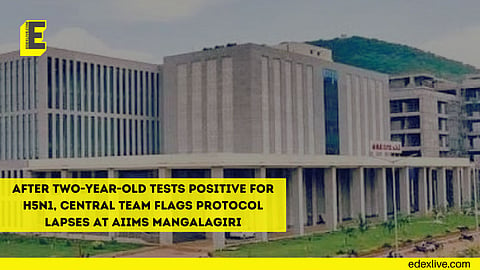

A central expert team has flagged lapses in hospital protocols at All India Institute Of Medical Sciences (AIIMS) Mangalagiri after a two-year-old girl from Narasaraopet, Palnadu district, tested positive for H5N1 (avian influenza). The team raised concerns over her treatment in the Pediatric Intensive Care Unit (PICU) instead of a single-bed isolation ward due to ventilator unavailability.
The team recommended testing all doctors and hospital staff involved in her treatment for H5N1 antibodies and reviewing patient admissions over nine days to identify any undetected cases. They also inspected the VRDL lab in Guntur and reviewed medical records.
A high-level central team from Delhi, including experts from the National Centre for Disease Control (NCDC), AIIMS Mangalagiri, the National Institute of Virology (NIV) Mumbai, and the Department of Animal Husbandry and Dairying (DAHD), arrived in Andhra Pradesh on Thursday to assess the situation. State health officials also participated in the investigation, stated a report by The New Indian Express.
The girl was admitted to AIIMS Mangalagiri on March 4 with fever, cough, and respiratory distress. Initially suspected of having dengue, she was later diagnosed with viral or bacterial pneumonia, scrub typhus, and leptospirosis. Her sample tested positive for Influenza A on March 7, but subtyping confirmed H5N1 only on March 31 at NIV Pune. AIIMS Mangalagiri had not reported the case to the IDSP-IHIP surveillance portal at the time, suggesting bird flu was not initially considered a major factor.
Meanwhile, the Animal Husbandry Department found no signs of disease among poultry in nearby villages. Local vendors reported no abnormalities in chicken stock.
Samples from poultry farms and the environment were sent to NIASHD Lab in Bhopal for further testing. Officials stated that traditional poultry selling practices ensure infected birds do not reach vendors, as they typically die before being sold.
Authorities have urged the public to rely on verified information rather than speculation. Investigations are ongoing, with officials working to strengthen surveillance and response measures to handle future cases effectively, according to the report by The New Indian Express.
